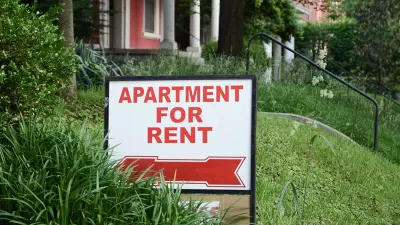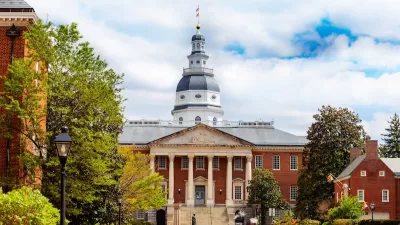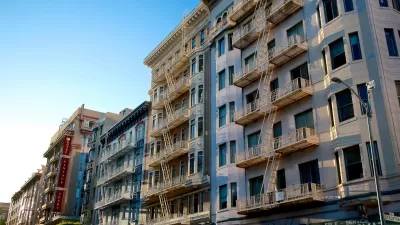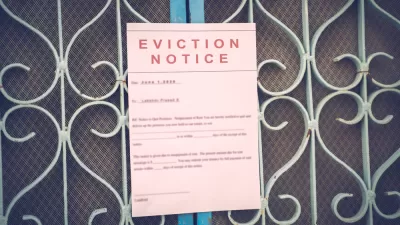The landlord tech industry, while alive and well prior to COVID-19, has ramped up in the past year to develop new ways to accumulate wealth at the expense of tenants.

Most renters know too well that COVID-19 has exacerbated racialized housing injustice, despite the powerful organizing efforts of an ever-growing housing justice movement. While numerous eviction moratoriums have passed in the U.S., these protections are weak and place the burden of proof on tenants. Most have only deferred rent debt, evictions, and houselessness. Currently, 17 million Americans are not up to date on rent payments, and 33 percent face eviction or foreclosure over the next two months. Even in cities with strong protections, landlords have been harassing and evicting tenants throughout the pandemic, instilling fear in an already confusing and shifting legislative landscape. As was the case prior to the pandemic, Black tenants have been hardest hit by evictions and eviction threats.
As tenants struggle to pay their rent, and housing prices drop and vacancy rates rise in high-cost cities such as San Francisco and New York City, landlords have repeatedly complained about losing revenue. And yet, the real estate industry appears to have plenty of money at its disposal as it spent almost $100 million in California to defeat a 2020 ballot initiative that would have limited unfair rent increases and preserved affordable housing. Furthermore, large landlords have also engaged in new forms of real estate speculation to capitalize upon the COVID-19 moment, such as investing in rent debt and exurban properties.
At the same time, an array of new real estate-oriented tech startups has emerged with tools to help landlords evict unruly or non-paying tenants. These technologies make up part of what the real estate industry describes as “property technology,” or “proptech,” and what we, as researchers with the Anti-Eviction Mapping Project and the AI Now Institute, in collaboration with people.power.media and the Ocean Hill-Brownsville Tenants Association, describe as “landlord technology.” The landlord tech industry, while alive and well prior to COVID-19, has ramped up in the past year to develop new ways to accumulate wealth at the expense of tenants.
Landlord Tech
What exactly is landlord tech, or proptech? This is a difficult question to answer thoroughly, in part because the industry is very secretive, but we can identify many examples. According to the real estate industry, it emerges from a combination of traditional real estate, big tech, venture capital, smart home systems, and financial technology. Manifestations of landlord tech can include tenant screening services, app-based short-term rental platforms, biometric facial recognition, and tools for real estate speculation.
Many date proptech’s origins to the 2008 financial crisis, when the real estate industry sought to implement emerging technologies to “disrupt” industry sluggishness, and when Airbnb and the “sharing” economy emerged. That period resulted in a large-scale shift to corporate ownership of housing, as investment companies and their shell company limited liability companies (LLCs) and limited partnerships (LPs) bought everything in sight. Proptech was used to facilitate this shift, by automating property management and asset acquisition.
We studied hundreds of companies, platforms, and their effects, and found that there are two distinct yet often overlapping categories of landlord tech being deployed:
....
FULL STORY: Keeping an Eye on Landlord Tech

Alabama: Trump Terminates Settlements for Black Communities Harmed By Raw Sewage
Trump deemed the landmark civil rights agreement “illegal DEI and environmental justice policy.”

Planetizen Federal Action Tracker
A weekly monitor of how Trump’s orders and actions are impacting planners and planning in America.

The 120 Year Old Tiny Home Villages That Sheltered San Francisco’s Earthquake Refugees
More than a century ago, San Francisco mobilized to house thousands of residents displaced by the 1906 earthquake. Could their strategy offer a model for the present?

Ken Jennings Launches Transit Web Series
The Jeopardy champ wants you to ride public transit.

BLM To Rescind Public Lands Rule
The change will downgrade conservation, once again putting federal land at risk for mining and other extractive uses.

Indy Neighborhood Group Builds Temporary Multi-Use Path
Community members, aided in part by funding from the city, repurposed a vehicle lane to create a protected bike and pedestrian path for the summer season.
Urban Design for Planners 1: Software Tools
This six-course series explores essential urban design concepts using open source software and equips planners with the tools they need to participate fully in the urban design process.
Planning for Universal Design
Learn the tools for implementing Universal Design in planning regulations.
Clanton & Associates, Inc.
Jessamine County Fiscal Court
Institute for Housing and Urban Development Studies (IHS)
City of Grandview
Harvard GSD Executive Education
Toledo-Lucas County Plan Commissions
Salt Lake City
NYU Wagner Graduate School of Public Service





























